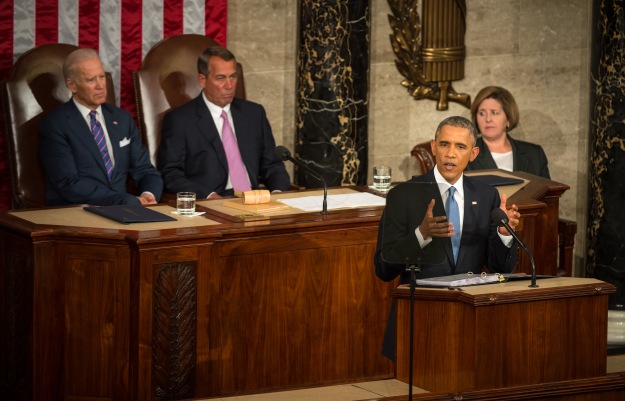
President Obama delivering his State of the Union address Tuesday night. Photo (cc) by NASA HQ.
Previously published at WGBHNews.org.
There’s plenty of fulminating in conservative media circles today over President Barack Obama’s unabashedly liberal State of the Union address.
Some of it is offered in world-weary tones suggesting that, once again, the grown-ups have to explain to the kids that the president doesn’t know what he’s talking about. “Mr. Obama’s income-redistribution themes are familiar,” The Wall Street Journal editorializes, “though they are amusingly detached from the reality of the largest GOP majority in Congress since 1949.”
Some of it is angry. “The president continues to count on and to exploit the ignorance of many of our fellow citizens,” thumps Scott Johnson of Power Line.
And some of it is just petulant. Breitbart’s Ben Shapiro concludes a long adolescent rant about Obama with this unmemorable line: “the state of his union sucks.”
Leave it to David Frum of The Atlantic, though, to explain what might have really been going on Tuesday night. A former speechwriter for President George W. Bush, Frum is the closest thing we’ve got these days to a moderate Republican commentator. And he thinks Obama was aiming his proposals — tax hikes for the rich, tax cuts for the middle class and new governmental benefits such as free community college — at an audience of one: Hillary Rodham Clinton.
“The intent, pretty obviously, is to box in his presumptive successor as head of the Democratic Party,” Frum writes. “Every time the president advances a concept that thrills his party’s liberal base, he creates a dilemma for Hillary Clinton. Does she agree or not? Any time she is obliged to answer, her scope to define herself is constricted.”
The effect, Frum predicts, will be to push the pro-business Clinton to the left and thereby hand an opportunity to the Republican presidential aspirants.
Whatever Obama’s motivation, there’s no question that his demeanor was that of a conquering hero rather than a weakened president facing the first all-Republican Congress of his tenure.
“Obama delivered an hour-long defense of his policies that at times sounded like a victory lap,” is how David Nakamura puts it in his lead story for The Washington Post. In The New York Times, Michael D. Shear calls Obama “confident and at times cocky.” Matt Viser of The Boston Globe says the president was “confident, brash, and upbeat.”
If nothing else, Obama demonstrated that he understood the atmospherics of the State of the Union. It’s a TV show, with all the entertainment values that implies. And thus there was no need for him to acknowledge the Democrats’ brutal performance in the November elections, or that the proposals he offered Tuesday have no more chance of passing than, say, Canadian-style health care. He had the podium, and the Republicans could applaud or not.
The timing was right for Obama as well. With the economy finally showing real improvement, the president’s job-approval ratings are up a bit. An ABC News/Washington Post poll puts Obama at 50 percent approve/44 percent disapprove, while an NBC News/Wall Street Journal survey has him at 46 percent approve/48 percent disapprove. Meanwhile, the public detests Congress as much as ever.
As for how the State of the Union was received, that’s a little harder to figure out. The only survey I’ve seen, from CNN/ORC, shows that 51 percent of viewers had a “very positive” reaction to Obama’s speech and 30 percent were “somewhat positive.” That’s sounds like a big thumbs-up until you look more closely at the numbers. It turns out that 39 percent of those surveyed were Democrats and just 20 percent were Republicans — a reflection of who watched the speech, not of public sentiment as a whole.
Another way of looking at that, though, is that Obama knew he was speaking to a friendly audience — not in Congress, but at home, as Democrats were far more likely to tune in than Republicans. So why not use the occasion to energize his supporters — and drive his enemies to distraction?
Obama’s detractors at Fox News were fairly restrained Tuesday night and online this morning. But you can be sure Bill O’Reilly, Megyn Kelly, et al. will be at it tonight. Meanwhile, consider this, from Charles Hurt of The Washington Times: “President Obama dedicated his State of the Union address to illegal aliens, college students and communist Cuba. In other words, all those imaginary supporters he claims to be hearing from ever since the actual American electorate denounced him, his party and his policies in last year’s beat-down election.”
More to the point, John Podhoretz writes in the New York Post that “in the most substantive speech he’s given in a long time, he has committed his presidency toward policies that have no hope of a serious hearing from the legislatures whose job it is to turn policies into law.”
Obama knows that, of course. The real message of the State of the Union was that the 2016 campaign has begun. Having long since concluded that the Republicans won’t compromise with him, the president delivered a political speech, aimed electing a Democratic president and Congress.

